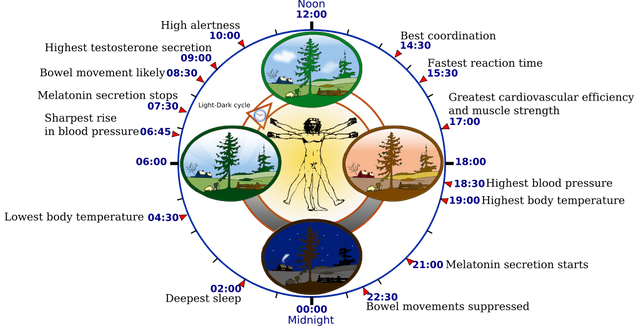Came across this interesting article:
Could We Use the Biological Clock to Fight Cancer?

Our circadian rhythms control everything from our digestion to sleep to mood to our immune system. Yet, it’s been a big mystery, up until recently. In October in fact, three American scientists shared the Nobel Prize in Medicine for uncovering how each cell coordinated with the internal body clock, which in turn is synchronized with the rotation of the Earth.
Science is beginning to unravel the finer points of our circadian rhythms. They are crucial when it comes to the aforementioned processes, and even such things as DNA repair and the cell cycle. This has implications for diseases, since many knock our body clock out of whack. Cancer is one.
In fact, a better understanding of our internal clock may help us to fight cancer, a new German study finds. The results were published in the journal PLOS Biology. Dr. Angela Relógio from the Charité-Medical University of Berlin, led the study. Her name actually means “clock” in Portuguese. By disrupting a cell’s internal clock or making it hyperactive, cancer cells can grow and multiply with impunity.

A circadian rhythm. Credit: Pixababy.
Knowing that cancer relies on rhythm disruption, Dr. Relógio and colleagues wondered if they could use the body clock to suppress tumors. They decided to experiment on mouse models. They looked at a protein known as RAS, which regulates a cell’s internal cycle. If the levels of RAS aren’t appropriate, it causes disharmony, which can lead to disease. RAS disruption occurs in about 25% of all human tumors.
Dr. Relógio said, "Based on our results, it seems to us that the clock is likely to act as a tumor suppressor, and that it is of advantage for cancer cells to circumvent circadian control." RAS regulates two important proteins called INK4a and ARF. Together, they control a cell’s internal clock. Increasing RAS in mice activated tumors, while decreasing it suppressed them, researchers found.
Although this study was performed on mouse models, others looking into resetting a person’s body clock, have illustrated the important role circadian rhythms play in cancer treatment. This new branch of therapy is known as chronotherapy. It works by changing a patient's sleep and waking times. “One cannot stop wondering whether disrupted circadian timing should be included as a next potential hallmark of cancer,” Relógio said. If these findings play out, we may someday have a cancer drug that suppresses RAS.
To learn more about circadian rhythms and how they affect our health, click here: